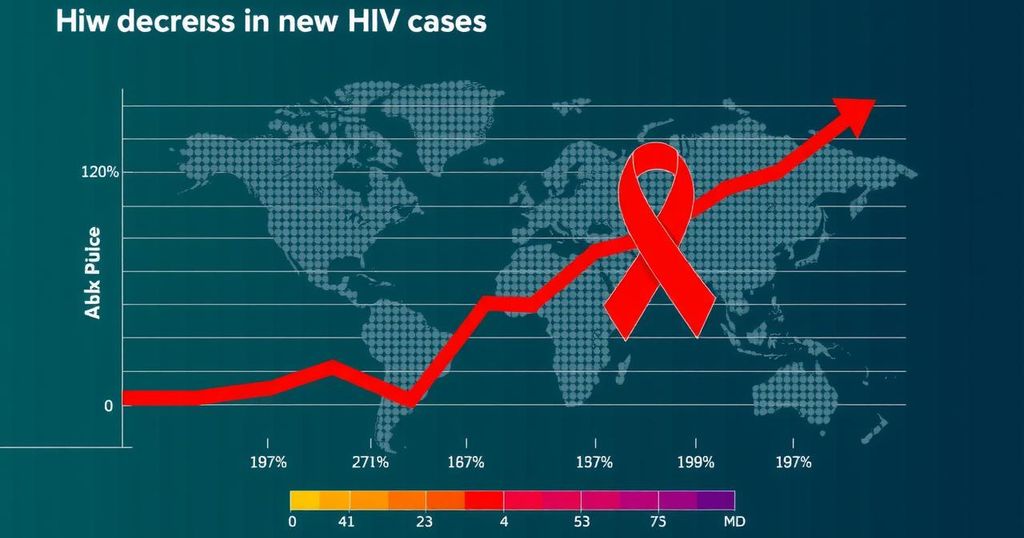The UNAIDS report indicates that new HIV infections reached their lowest level since the late 1980s, with about 1.3 million cases in 2023. Despite progress in reducing deaths, approximately 630,000 people died from AIDS-related illnesses last year, and access to critical treatments remains inadequate, particularly in 28 countries where infections increased. Structural discrimination and high drug prices hinder further gains in combating the epidemic.
The United Nations has reported a significant decline in new HIV cases, revealing that last year witnessed the fewest infections since the late 1980s, with approximately 1.3 million new infections in 2023. While this statistic marks progress, it remains alarmingly above the levels necessary to meet the UN’s target of eliminating AIDS as a public health threat by the year 2030. The report highlights the continued necessity for comprehensive interventions and emphasizes the disparities in treatment accessibility.
Despite advancements, the report states that around 630,000 individuals died from AIDS-related illnesses in 2023, reflecting a decrease from the peak of 2.1 million deaths recorded in 2004. The report attributes much of this progress to the efficacy of antiretroviral therapies that lower viral loads in patients’ blood. However, it warns that nearly 9.3 million of the 40 million people living with HIV globally are still not receiving necessary treatment.
Notably, while advancements have been made in many regions, 28 countries actually reported an increase in HIV infections during the past year. Access to Pre-Exposure Prophylaxis (PrEP), a vital preventative treatment, has been described as insufficient, with only 15 percent of those in need receiving the medication in 2023. UNAIDS Deputy Director Christine Stegling acknowledged the role of biomedical innovations but cautioned that protection gaps in human rights continue to impede global progress in combating HIV.
Moreover, discriminatory laws, such as Uganda’s Anti-Homosexuality Act, have markedly restricted access to preventive services like PrEP. Axel Bautista, a gay rights advocate from Mexico City, asserted the detrimental effects of criminalization on public health, exacerbating violence and discrimination against individuals living with HIV. The report also introduced lenacapavir, a new drug that has shown promise in preventing HIV, though its high cost remains a concern.
While Gilead, the pharmaceutical manufacturer, has begun collaborating with generic producers to offer lower pricing in certain countries, many patients remain outside the purview of these agreements. Stegling emphasized the necessity for equitable access to these breakthrough treatments if they are to make a meaningful impact on infection rates. This report arrives amid broader discussions on human rights and health equity, underscoring the need for comprehensive measures to eradicate AIDS and protect vulnerable populations ahead of the 2030 deadline.
The UNAIDS report provides critical insights into the current state of HIV infections and related health outcomes globally. It highlights progress against the disease while also revealing persistent challenges, including disparities in treatment access and the impact of stigmatizing laws on public health efforts. The report serves as a reminder of the urgency for continued advocacy, legislative reform, and increased funding for HIV prevention and treatment initiatives to achieve the ambitious goal of eliminating AIDS as a public health threat by 2030.
In conclusion, while the 2023 UNAIDS report indicates a notable decrease in new HIV infections and deaths, significant challenges persist in achieving global health targets. Access to treatment and preventive measures remains uneven, particularly in regions where discriminatory laws create barriers to care. Continued advocacy for equitable access to health resources and reforms in public policy are essential to ensuring all individuals living with HIV receive necessary treatment and support.
Original Source: www.seychellesnewsagency.com






